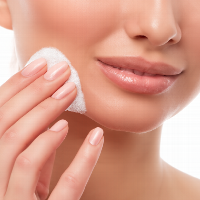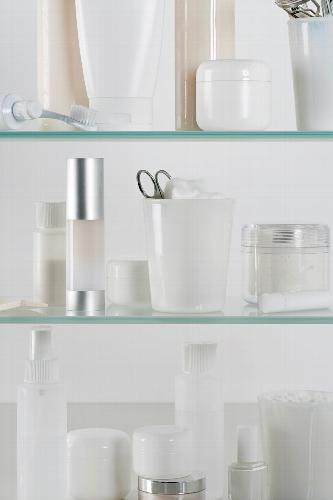Keeping your skincare and beauty products fresh isn't just about clutter control; it's about hygiene, effectiveness, and protecting your skin from unwanted irritation. Did you know that your skincare products could be hiding bacteria if kept too long? Or that your sunscreen might be less effective if it's expired? Knowing when to replace toiletries is crucial for maintaining a safe and effective beauty routine.
Many people are surprised to learn that toiletries don't last forever. Over time, the active ingredients in these products degrade, preservatives lose their power, and containers become a breeding ground for bacteria. This guide will help you identify the lifespan of common toiletries, spot signs that your products might be past their prime, and understand why timely replacement matters.
In this blog, we'll cover:
General Shelf Life Guidelines: How to determine a product's lifespan and what to look for on packaging.
When to Replace Common Toiletries: A product-by-product breakdown of how often you should replace each item in your toiletry bag.
Signs a Product Needs to Be Replaced Sooner: Red flags like texture, colour, or odour changes that signal it's time to toss a product.
Why It's Important to Replace Toiletries Regularly: The health, safety, and skincare benefits of using fresh products.
General Shelf Life Guidelines
When it comes to beauty and personal care products, understanding shelf life is crucial. Most toiletries don't last forever, and using them past their prime can lead to skin irritation, breakouts, or reduced effectiveness. Here are general guidelines to help you keep track of how long to use common toiletries—and how to store them properly to extend their shelf life.
How to Determine Shelf Life
Look for the PAO (Period After Opening) Symbol:
Many products display an open-jar symbol with a number and an “M” (e.g., “12M” for 12 months). This symbol tells you how long the product stays fresh after it's opened.
The PAO period starts as soon as you first open the product, so it's helpful to write the opening date on the container as a reminder.
Expiration Dates on the Packaging:
Some products, especially those with active ingredients like sunscreens or acne treatments, will have a specific expiration date printed on the packaging. Always follow these dates for optimal results and safety.
General Shelf Life for Unopened Toiletries:
Skincare products: Typically 2–3 years if unopened.
Toothpaste and sunscreens: Usually 1–2 years.
Shampoos and conditioners: Around 3 years.
Perfumes: Up to 3 years if stored well, though the scent may change slightly over time.
Storage Tips to Extend Product Life
Keep Products Cool and Dry:
Avoid Heat and Humidity: Store toiletries in a cool, dry place (even outside the bathroom if possible), as heat and humidity can speed up product breakdown and spoilage.
Avoid Direct Sunlight: Light exposure can degrade ingredients, especially in products with active compounds like vitamin C or retinoids, Store them in dark places or closed cabinets.
Seal Tightly After Each Use:
Close lids tightly to minimize air exposure, which can lead to oxidation and bacterial contamination, This is especially important for skincare products in jars or bottles.
Consider Refrigerator Storage for Certain Items:
Some products, such as eye creams, vitamin C serums, and natural or preservative-free items, last longer when stored in the refrigerator. This can help slow down the breakdown of active ingredients and keep them fresh longer.
Avoid Frequent Dipping and Contamination:
Use clean hands, spatulas, or applicators to avoid introducing bacteria, which can speed up spoilage. Avoid dipping your fingers into jars; instead, transfer products to your hands or a tool.
Regularly Clean Applicators and Brushes:
For products that require brushes or sponges (like foundation or face masks), keeping these tools clean will help reduce contamination in the product itself.
By following these simple guidelines, you can keep your beauty and personal care products fresh, effective, and safe for longer! Up next, we'll dive into When to Replace Common Toiletries, where we break down specific lifespans for each product.
When to Replace Common Toiletries
Not all toiletries are created equal when it comes to shelf life. Some can last for years, while others need to be replaced within months. Here's a guide to help you decide when to swap out your common products to ensure they remain safe and effective.
Facial Cleanser
Lifespan: 6–12 months after opening.
Why: Over time, cleansers lose their effectiveness, and preservatives start to break down. Replace if you notice any changes in texture or scent.
Moisturizer and Lotion
Face Moisturizers: Replace every 6–12 months.
Body Lotions: Replace every 12–18 months.
Why: Moisturizers can become a breeding ground for bacteria, especially if they're jarred. Plus, active ingredients may degrade, reducing their effectiveness.
Sunscreen
Lifespan: 6–12 months after opening or by the expiration date.
Why: Sunscreen's protective ingredients break down over time, so using expired sunscreen won't provide reliable protection. Check the expiration date and replace if it smells off or has changed in consistency.
Shampoo and Conditioner
Lifespan: 12–18 months after opening.
Why: Although shampoos and conditioners can last a bit longer, preservatives eventually lose their strength, leading to potential bacterial growth. Discard if the smell or texture seems different.
Toothpaste
Lifespan: 1 year or as indicated on the expiration date.
Why: Fluoride in toothpaste degrades over time, making it less effective for protecting teeth from cavities.
Deodorant
Lifespan: 6–12 months for natural deodorants; up to 2 years for regular deodorants. Why: Natural deodorants without preservatives break down faster. If you notice it's less effective or smells different, it's time to replace.
Makeup Remover
Lifespan: 6–12 months.
Why: Water-based makeup removers are prone to bacterial contamination, especially if they're frequently exposed to moisture. Discard if it appears cloudy or smells strange.
Body Wash and Bar Soap
Body Wash: Replace every 1 year.
Bar Soap: Replace every 3 years if kept dry.
Why: Liquid soaps are more susceptible to bacterial growth, while bar soaps last longer if stored dry. Replace if the product looks separated or has an odd smell.
Razors and Razor Blades
Lifespan: Replace after 5–7 uses or weekly.
Why: Dull blades can cause irritation and cuts, If a blade starts to pull or tug instead of gliding smoothly, it's time for a new one.
Lip Balm
Lifespan: 6–12 months.
Why: Lip balm can collect bacteria from frequent contact with your lips. Stick formulas typically last longer than pots but discard if it smells off or feels unusual.
Eye Cream
Lifespan: 6 months after opening.
Why: The delicate skin around the eyes is prone to irritation from bacteria. Eye creams also lose potency over time, so keep an eye on texture changes.
Perfume and Cologne
Lifespan: 2–3 years.
Why: Fragrances can change scent if exposed to light or heat for too long. Proper storage in a cool, dark place can extend their life.
Regularly replacing toiletries ensures that they're working effectively and safely. Up next, we'll explore Signs a Product Needs to Be Replaced Sooner, including tell-tale signs like changes in colour, smell, or texture that indicate a product has expired before its typical lifespan.
Signs a Product Needs to Be Replaced Sooner
Even if a product hasn't reached its typical expiration date, some signs may indicate that it's no longer safe or effective to use. Here are the main red flags to look for that signal it's time to toss a toiletry item:
Changes in Colour
What to Look For: If your product has changed colour—like a moisturizer turning yellowish or sunscreen becoming brown—it's a sign that the ingredients may have oxidized or broken down.
Why It Matters: Colour changes indicate that active ingredients, particularly in skincare products with antioxidants or vitamins, are no longer stable or effective.
Unusual Odour
What to Look For: A sour, musty, or rancid smell is a major indicator that a product has spoiled. Deodorants, lotions, and creams are particularly prone to developing an off smell if bacteria or fungi have started to grow.
Why It Matters: Bad odours suggest bacterial growth or chemical breakdown, which can lead to skin irritation or infections.
Altered Texture
What to Look For: If a product separates, clumps, or becomes unusually thick or watery, it may be time to replace it. Creams should remain smooth and consistent; lotions shouldn't separate.
Why It Matters: Changes in texture can indicate that the formulation has degraded and may no longer provide the intended benefits.
Presence of Bubbles or Foam
What to Look For: If you see unexpected bubbles or foam in products like cleansers, this might indicate bacterial contamination.
Why It Matters: Bacterial contamination can lead to skin infections and irritations.
Expiration Date Approaching
What to Look For: Products close to their expiration date or PAO date should be replaced to ensure effectiveness.
Why It Matters: Using products past their expiration can reduce their effectiveness and compromise skin health.
Dull or Patchy Application
What to Look For: If your foundation or concealer no longer goes on smoothly or appears patchy, it might be time to replace it.
Why It Matters: Dull application can be due to the product breaking down, which can also affect its coverage and finish.
Being aware of these warning signs can help you maintain a fresh and effective beauty routine. Next, let's discuss Why It's Important to Replace Toiletries Regularly to protect your skin and enhance your overall well-being.
Why It's Important to Replace Toiletries Regularly
Regularly replacing your toiletries is essential for several reasons. Here's why maintaining a fresh supply matters for your skin, hygiene, and overall health:
Protects Skin Health
Expired products can lead to skin irritations, breakouts, and allergic reactions. Using fresh toiletries ensures your skin gets the best care and minimizes potential reactions.
Maintains Product Efficacy
Active ingredients in skincare and beauty products lose their potency over time. Using outdated products can prevent you from seeing the desired results, whether it's clear skin, hydration, or sun protection.
Prevents Bacterial Growth
Old products can become a breeding ground for bacteria and fungi, which can lead to infections, acne flare-ups, or other skin issues. Fresh products minimize these risks and help maintain good hygiene.
Enhances Self-Care Routines
Using effective, fresh products turns your daily routines into moments of self-care. Knowing that you're using high-quality, non-expired items can enhance your experience and confidence in your skincare routine.
Saves Money in the Long Run
By regularly assessing and replacing your toiletries, you avoid the costs associated with treating skin issues or purchasing products that don't work effectively because they're expired.
Promotes a Clean and Organized Space
Regularly going through your toiletry collection not only keeps it organized but also prevents clutter. A clean, organized space can positively impact your mindset and overall well-being.
Increases Awareness of Product Ingredients
When you regularly replace products, you also take the time to review ingredient labels, leading to a better understanding of what you're applying to your skin. This awareness helps you choose products that align with your personal values and skin needs.
By staying mindful of your product's shelf life and condition, you can enjoy the full benefits of your beauty and personal care routines.
Conclusion
Keeping track of your toiletry shelf life might seem like a hassle, but it's essential for maintaining healthy skin and overall hygiene. By regularly replacing your products and recognizing the signs that it's time to toss something, you can ensure that you're using only the best and most effective items on your skin.
Thanks for reading! If you found this guide helpful, share it with friends and family to help them keep their beauty routines fresh, too. Here's to fresh, effective products and a beauty routine you can feel great about!




